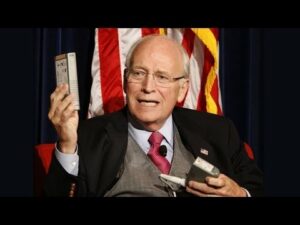By Mark Ellis

He is the conservative that liberals love to hate. Within minutes of the news that former Vice-President Dick Cheney had received a heart transplant, some were poking around the story in attempts to find some reason to question an operation that may have saved his life – or extended it a few more years.
One question that has not been posed is whether the heart operation will alter his personality. When Christians speak about their redemption or “born again” experience, they often talk about having a new heart. It’s as if God has reached in and removed one clogged and calcified, broken-down organ and replaced it with another.
As new creatures, we have new desires and interests for fellowship with God and other believers, a new love for the Bible, worship, and prayer – activities that may have aroused little interest before our “heart transplants.”
Science has confirmed that the physical heart inside your body is more than just a mechanical pump. Dr. J. Andrew Armour, one of the early pioneers in “neurocardiology,” introduced the idea of a functional “heart brain” in 1991. With as many as 40,000 neurons, the heart has a complex nervous system that is sufficiently sophisticated to qualify as a “little brain” in its own right, he believes.
Perhaps this explains why heart transplant recipients report some very unusual changes to their personalities and interests following their surgeries.
There is the case of a demure and retiring woman, a teetotaler who disliked football. She received a new heart from a motorcyclist involved in a crash. After her transplant, she shocked her family with a much more aggressive personality, a new taste for beer drinking, and an interest in NFL football.
Another transplant recipient who could barely write suddenly developed a gift for writing poetry.
One recipient was surprised by his new-found love of classical music. Later he found out the donor loved classical music and played the violin. Sadly, he also discovered the donor died in a drive-by shooting as he held his violin in his arms.
For many years, my wife and I have had our cars serviced by a man named Dick. Dick is a manly man – a John Wayne-type character. I would never characterize the waiting room to his shop as particularly clean. In fact, it was usually somewhat dingy and unremarkable looking, what one would expect at a mechanic’s facility.
A few years ago, he received a heart transplant from a 35-year-old woman. The next time I walked into the waiting room of his shop after the surgery, I noticed it had new wallpaper, an Oriental rug on the floor, and several designer accents.
When I inquired about the changes, I was informed, “Dick did that.”
That’s curious, I thought. I never knew Dick to have a flair for decorating. Then when he came out and spoke to me, I was even more surprised. His method of communication completely changed, with much more expressive use of his hands than before. He spoke at a faster clip, and his voice seemed an octave higher.
While these examples may be anecdotal, Dr. Candace Pert, a professor at Georgetown University, believes the mind is not just in the brain, but also exists throughout the body.
This thinking could explain some of the unusual transplant experiences. “The mind and body communicate with each other through chemicals known as peptides,” says Dr. Pert. “These peptides are found in the brain as well as in the stomach, in muscles and in all of our major organs. I believe that memory can be accessed anywhere in the peptide/receptor network.”
All these factors leave us wondering about our former vice-president. At this point, there is little known about his heart donor. Perhaps Dick Cheney will not exhibit any dramatic changes to his personality.
With this emerging understanding of the body, those of us with hearts “transplanted” by the Great Physician should not be completely surprised by new-found interests and desires that emerge in him during the coming months.



